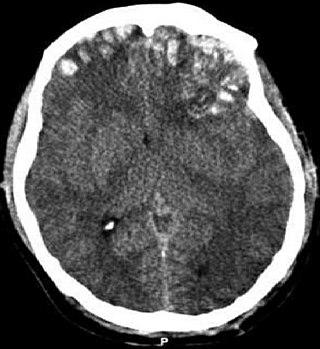This article relies largely or entirely on a single source .(April 2019) |
| Traumatic spondylopathy | |
|---|---|
| Specialty | Rheumatology |
Traumatic spondylopathy is a form of dorsopathy. It is a slippage of a vertebral body secondary to a traumatic injury. [1]
This article relies largely or entirely on a single source .(April 2019) |
| Traumatic spondylopathy | |
|---|---|
| Specialty | Rheumatology |
Traumatic spondylopathy is a form of dorsopathy. It is a slippage of a vertebral body secondary to a traumatic injury. [1]

Unconsciousness is a state in which a living individual exhibits a complete, or near-complete, inability to maintain an awareness of self and environment or to respond to any human or environmental stimulus. Unconsciousness may occur as the result of traumatic brain injury, brain hypoxia, severe intoxication with drugs that depress the activity of the central nervous system, severe fatigue, pain, anaesthesia, and other causes.
Post-traumatic stress disorder (PTSD) is a mental and behavioral disorder that develops from experiencing a traumatic event, such as sexual assault, warfare, traffic collisions, child abuse, domestic violence, or other threats on a person's life or well-being. Symptoms may include disturbing thoughts, feelings, or dreams related to the events, mental or physical distress to trauma-related cues, attempts to avoid trauma-related cues, alterations in the way a person thinks and feels, and an increase in the fight-or-flight response. These symptoms last for more than a month after the event. Young children are less likely to show distress, but instead may express their memories through play. A person with PTSD is at a higher risk of suicide and intentional self-harm.

In medicine, traumatology is the study of wounds and injuries caused by accidents or violence to a person, and the surgical therapy and repair of the damage. Traumatology is a branch of medicine. It is often considered a subset of surgery and in countries without the specialty of trauma surgery it is most often a sub-specialty to orthopedic surgery. Traumatology may also be known as accident surgery.

Brain injury (BI) is the destruction or degeneration of brain cells. Brain injuries occur due to a wide range of internal and external factors. In general, brain damage refers to significant, undiscriminating trauma-induced damage.

A concussion, also known as a mild traumatic brain injury (mTBI), is a head injury that temporarily affects brain functioning. Symptoms may include loss of consciousness; memory loss; headaches; difficulty with thinking, concentration, or balance; nausea; blurred vision; dizziness; sleep disturbances, and mood changes. Any of these symptoms may begin immediately, or appear days after the injury. Concussion should be suspected if a person indirectly or directly hits their head and experiences any of the symptoms of concussion. Symptoms of a concussion may be delayed by 1–2 days after the accident. It is not unusual for symptoms to last 2 weeks in adults and 4 weeks in children. Fewer than 10% of sports-related concussions among children are associated with loss of consciousness.
Repressed memory is a controversial, and largely scientifically discredited, psychiatric phenomenon which involves an inability to recall autobiographical information, usually of a traumatic or stressful nature. The concept originated in psychoanalytic theory where repression is understood as a defense mechanism that excludes painful experiences and unacceptable impulses from consciousness. Repressed memory is presently considered largely unsupported by research. Sigmund Freud initially claimed the memories of historical childhood trauma could be repressed, while unconsciously influencing present behavior and emotional responding; he later revised this belief.
Psychological trauma is an emotional response caused by severe distressing events that are outside the normal range of human experiences. It must be understood by the affected person as directly threatening the affected person or their loved ones with death, severe bodily injury, or sexual violence; indirect exposure, such as from watching television news, may be extremely distressing and can produce an involuntary and possibly overwhelming physiological stress response, but does not produce trauma per se. Examples include violence, rape, or a terrorist attack.

A traumatic brain injury (TBI), also known as an intracranial injury, is an injury to the brain caused by an external force. TBI can be classified based on severity ranging from mild traumatic brain injury (mTBI/concussion) to severe traumatic brain injury. TBI can also be characterized based on mechanism or other features. Head injury is a broader category that may involve damage to other structures such as the scalp and skull. TBI can result in physical, cognitive, social, emotional and behavioral symptoms, and outcomes can range from complete recovery to permanent disability or death.
Acute stress reaction and acute stress disorder (ASD) is a psychological response to a terrifying, traumatic or surprising experience. Combat stress reaction (CSR) is a similar response to the trauma of war. The reactions may include but are not limited to intrusive or dissociative symptoms, and reactivity symptoms such as avoidance or arousal. It may be exhibited for days or weeks after the traumatic event. If the condition is not correctly addressed, it may develop into post-traumatic stress disorder (PTSD).
A flashback, or involuntary recurrent memory, is a psychological phenomenon in which an individual has a sudden, usually powerful, re-experiencing of a past experience or elements of a past experience. These experiences can be frightful, happy, sad, exciting, or any number of other emotions. The term is used particularly when the memory is recalled involuntarily, especially when it is so intense that the person "relives" the experience, and is unable to fully recognize it as memory of a past experience and not something that is happening in "real time".
Developmental disability is a diverse group of chronic conditions, comprising mental or physical impairments that arise before adulthood. Developmental disabilities cause individuals living with them many difficulties in certain areas of life, especially in "language, mobility, learning, self-help, and independent living". Developmental disabilities can be detected early on and persist throughout an individual's lifespan. Developmental disability that affects all areas of a child's development is sometimes referred to as global developmental delay.
Complex post-traumatic stress disorder is a stress-related mental disorder generally occurring in response to complex traumas, i.e., commonly prolonged or repetitive exposures to a series of traumatic events, within which individuals perceive little or no chance to escape.
Post-concussion syndrome (PCS), also known as persisting symptoms after concussion, is a set of symptoms that may continue for weeks, months, or years after a concussion. PCS is medically classified as a mild traumatic brain injury (TBI). About 35% of people with concussion experience persistent or prolonged symptoms 3 to 6 months after injury. Prolonged concussion is defined as having concussion symptoms for over four weeks following the first accident in youth and for weeks or months in adults.

Chronic traumatic encephalopathy (CTE) is a neurodegenerative disease linked to repeated trauma to the head. The encephalopathy symptoms can include behavioral problems, mood problems, and problems with thinking. The disease often gets worse over time and can result in dementia.

Traumatic insemination, also known as hypodermic insemination, is the mating practice in some species of invertebrates in which the male pierces the female's abdomen with his aedeagus and injects his sperm through the wound into her abdominal cavity (hemocoel). The sperm diffuses through the female's hemolymph, reaching the ovaries and resulting in fertilization.
A trauma trigger is a psychological stimulus that prompts involuntary recall of a previous traumatic experience. The stimulus itself need not be frightening or traumatic and may be only indirectly or superficially reminiscent of an earlier traumatic incident, such as a scent or a piece of clothing. Triggers can be subtle, individual, and difficult for others to predict. A trauma trigger may also be called a trauma stimulus, a trauma stressor or a trauma reminder.
Post-traumatic amnesia (PTA) is a state of confusion that occurs immediately following a traumatic brain injury (TBI) in which the injured person is disoriented and unable to remember events that occur after the injury. The person may be unable to state their name, where they are, and what time it is. When continuous memory returns, PTA is considered to have resolved. While PTA lasts, new events cannot be stored in the memory. About a third of patients with mild head injury are reported to have "islands of memory", in which the patient can recall only some events. During PTA, the patient's consciousness is "clouded". Because PTA involves confusion in addition to the memory loss typical of amnesia, the term "post-traumatic confusional state" has been proposed as an alternative.

Eliprodil is an NMDA antagonist drug candidate which selectively inhibits the NR2B (GLUN2B) subtype NMDA receptor at submicromolar concentrations. Eliprodil failed a Phase III clinical trial for the treatment of acute ischemic stroke in 1996, sponsored by Synthélabo Recherche.

Dental trauma refers to trauma (injury) to the teeth and/or periodontium, and nearby soft tissues such as the lips, tongue, etc. The study of dental trauma is called dental traumatology.
Trauma most often refers to: